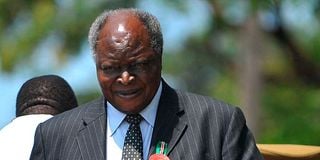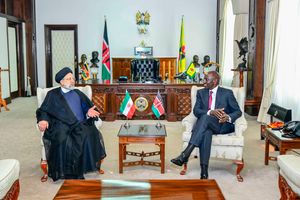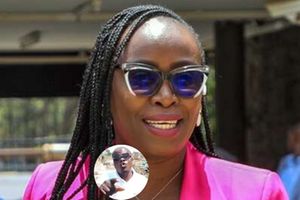Adieu Mzee Mwai Kibaki, the top intellectual who made Kenya great

Former president Mwai Kibaki.
Peter Kagwanja: Adieu Mzee Mwai Kibaki, the top intellectual who made Kenya great
Pericles made Athens great. This epitaph of the great Greek statesman who lifted his city into a golden age befits Mwai Kibaki, who died on April 21, 2022, at the age of 90.
Kibaki made Kenya great. Kenya’s second intellectual president – after Jomo Kenyatta – is one of the most consequential African leaders of the 21st Century. As early as 1974, the Time magazine had rated him among the top 100 people in the world who had the potential to lead. Kibaki’s bountiful political career has a seven-pronged legacy.
First, Kenya’s third President is a rare case of a Mt Kenya intellectual-turned-politician. A laureate of Makerere University (Uganda), Kibaki studied economics, history and political science where he also taught economics. At the request of then Vice-President Jaramogi Oginga Odinga and Kanu secretary-general Thomas Joseph Mboya, Kibaki left Makerere and returned to Kenya to become an executive officer of the party. As Kanu’s lead intellectual, Kibaki was among the most influential makers of modern Kenya. He helped draft Kenya's independence constitution, the Kanu manifesto for independence, social democracy and stability (1963) and the seminal Sessional Paper No. 10 of 1965 on African Socialism and its Application to Planning in Kenya. Ideologically, these documents anchored on the trilogy of capitalism, free market and democracy, firmly embedded in the welfarism and moral universe of African Socialism.
Second is his style of leadership. Like Singapore’s Lee Kuan Yew, Kibaki took a solution-based approach to leadership. Although an ‘economic conservative’ and a ‘moderate radical’, Kibaki never tethered his thoughts to any particular ideology. He pragmatically went for what worked. Working under him, one immediately realised that he was a keen listener and an ‘integrative thinker’ who valued advice, new ideas and centring consultations on solutions. He was ill at ease with leaders who dwelt on gossip, hearsay and tittle-tattles.
Cabinet minister
As MP, Cabinet minister, Kenya’s fourth vice -president (1978-1988), opposition MP (1992-2002), Leader of Official Opposition (1998-2002) and President (2002-2013), Kibaki proved himself as an astutely versatile politician. In 1974, he moved his political base from Donholm (later Bahati and now Makadara) in Nairobi where he was MP (1963-1974) to his rural Othaya constituency (1974-2013).
In 1988, when Moi dropped him as Vice President and made him Minister for Health, he humbled himself in strategic acquiescence. And in December 1991, only days after the repeal of Section 2A of the Constitution and Kenya’s return to pluralism, he resigned to form the Democratic Party of Kenya as the vehicle for his presidential bid in the 1992 multi-party elections. But his gentlemanly and non-confrontational style had its fierce critics. Kibaki “never saw a fence he didn't sit on", journalist Kwendo Opanga famously wrote.
Third, Kibaki was an economic moderniser. As Finance minister, he oversaw Kenya’s golden period, which was marked by relative prosperity, fuelled by a commodities boom, especially in the coffee sector, with remarkable fiscal discipline and sound monetary policies. As Kenya’s third President, he largely built modern Kenya as we know it today.
Universal equaliser
Recognising education as the universal equaliser and engine of development, upon coming to power in January 2003, Kibaki unveiled an audacious free primary education initiative. This initiative, which gave more than one million children who would not have been able to afford school a chance, won praise across the world, including from US President Bill Clinton.
In June 2003, his government adopted the Economic Recovery Strategy for Wealth and Employment Creation (2003 – 2007), which morphed into Vision 2030 and was unveiled in October 2006 as a long-term development blue-print to transform Kenya into a middle-income country by 2030.
Kenya’s GDP growth rose meteorically from a low of 0.6 per cent (real −1.6 per cent) in 2002 to seven per cent by December 2007, stabilising at over five per cent by the time he left office in April 2013.
Guided by Armatya Sen’s idea of development as freedom, he re-focused attention on the hitherto neglected semi-arid or arid north, returned collapsed state corporations to profitability and invested in the telecommunications sector and in rebuilding, modernising and expansion of infrastructure and the country's cities and towns.
The Thika Superhighway remains an iconic feature of his ambitious infrastructure projects. In 2003, Kibaki introduced the Constituency Development Fund (CDF) to combat grassroots poverty and control imbalances in regional development brought about by partisan politics.
Fourth, Kibaki institutionalised a culture of democracy in Kenya. At his inauguration on December 29, 2002, he made the historic declaration: “Government will no longer be run on the whims of individuals.” He moved to dismantle the stifling personality cult. “Kimenyi umwe ndatuire” (the know-it-all man is no more), he quipped. His Government ended the culture of political detentions and recognised Mau Mau as Kenya’s bona fide liberation force, immortalising its leader, Dedan Kimathi, with a statue at the heart of Nairobi.
2010 Constitution
Fifth, Kibaki’s most enduring legacy is the 2010 Constitution. I served as his Chief Strategist ahead of the Kenyan constitutional referendum of August 4, 2010. The hallmark of the Constitution is devolution as the fulcrum of “Kenya’s quiet revolution”. According to Kibaki’s son, Jimmy, “The promulgation of the new Constitution was his greatest moment ... It was a very deep and emotional moment for him."
Seventh, Kibaki reduced Kenya's dependence on western donor aid and increased internally generated resources. “Ours is a government of the people, by the people, funded by the people,” he declared proudly on December 12, 20007. A new foreign policy, which I was involved in drafting, adopted the “Look East” orientation, and improved relations with China, Japan, the Asian Tigers and other non-western as important economic partners.
Failure to slay the dragon of corruption, defeat of the 2005 Kenyan constitutional referendum and the 2008 post-election violence were the lowest moments of the Kibaki era. But by April 9, 2013, when he handed over the presidency to Uhuru Kenyatta, Kenya had pulled back from the brink. Adieu Mzee Kibaki.
Prof Peter Kagwanja advised President Mwai Kibaki’s Government from August 2008 to February 2013.





